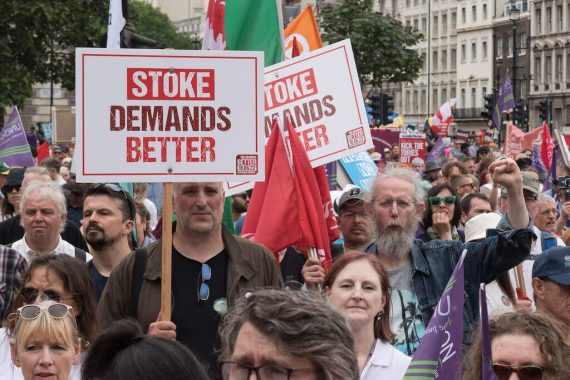The world is burning, with literal fires, but also in the sense of overheating economies. That is, economies growing at a faster rate than their potential. How is that possible, you might wonder. It’s not. And therefore, excess growth translates into inflation.
Macroeconomists in the United States are divided into at least two camps. One camp favors slowing down the economy to bring inflation within manageable levels. They think persistent inflation is the bigger problem. The other camp opposes overreacting to inflation, as drastic measures to control inflation may hurt economic growth and throw the economy into recession.
The rest of the economists – mostly, non-macroeconomics folk – who are watching things from the fence, realize there’s a fire in the woods, i.e., inflation is becoming red-hot. Yet, even though they may not have a specific take on policy for tackling inflation, there’s a shared understanding among economists – macro and micro – that people running from this proverbial fire may just be overreacting. In other words, inflation is bad, but it’s not nearly as bad as the common person thinks.
Has the inflation problem been blown out of proportion?
According to Moody’s Analytics, consumers in the U.S. are estimated to be spending about $500 more a month than they used to a year earlier. House rents have gone up by roughly 25% on average. Almost half of the consumers in the United Kingdom are spending less on clothes and shoes, and feel financially worse off. And an increasing number of Germans have to rely on food banks.
Sri Lanka is literally burning, with actual instances of arson, as people protest against crushing inflation, which has accompanied a default on the country’s debt. But it is only one of the 12 countries that were covered by Reuters in a recent story, “The Big Default,” pointing to 11 other countries on the edge. Unmanageable levels of inflation are already shrinking fiscal space in poorer economies as governments try to help people get out of the quagmire. And ironically, policies, with which governments are trying to help people, are again sometimes bringing in more inflation.
Yet an economist may light a cigar and tell you to relax. It’s not perhaps as bad as it seems: inflation does not hurt your purchasing power. If there’s 10% inflation, you will get some increase in income too – say, as a taxi driver you’d charge more; if you’re a programmer, your company will give you a salary raise, and so on. You are getting compensated, but perhaps don’t realize it. You’re probably falling for the “inflation fallacy”: the mistaken belief that inflation erodes your purchasing power.
To quote one statistic, from Nobel laureate economist Robert Shiller’s (1997) comprehensive survey, “Why Do people Dislike Inflation?” non-economists believed that sudden high inflation would hurt the standard of living of about 70% of the population; economists, on the other hand, guesstimated the figure to be around 50% of the population. In almost all responses, economists expressed relatively less concern for inflation.
Arguably, there is no one-for-one compensation for inflation in the real world. For instance, if inflation is coming from a sudden surge in oil prices, which largely explains the current global inflation, there is no reason to expect such spontaneous compensation, even according to economic theory.
A taxi driver may raise the price as fuel gets expensive, but they’d also notice the demand for rides – and their income – falls. On the buyers’ end, people using the taxi service will also be bearing the brunt of higher energy prices and will likely cut spending on taxis. Inflation hurts both the supplier of travel services and the buyer.
Only an oil production company may benefit from higher oil prices. But the takeaway here is that inflation affects different sectors of the economy differently and most are hurt when inflation is unexpected and high.
Moreover, people at different income levels get hit by inflation differently. Easterly and Fischer (2001) found that high inflation hurts the poor more than the rich, and the slice of the poor in the national income pie shrinks. This is because the poor spend a bigger percentage of their income on essentials, like food and energy (think about the irreplaceable need to cook food!). When essentials become pricier, as is happening now, the poor become poorer, and even the lower-middle class isn’t spared. Understandably, lower-income Eurozone consumers are feeling the inequality increase in the current crisis.
According to an estimate by Mahler et al. (2022), an additional 75 to 95 million people in the world could slip into poverty, due to the pandemic, war, and inflation. Even being from a particular race may expose you to higher inflation – owing to greater dependence on specific goods – highlighted in one of the presentations at the “Unequal Inflation Impacts” conference, hosted by the Federal Reserve Bank of Minneapolis.
Recommended
Currently, in many economies, including Australia, the United Kingdom, the United States, the Eurozone, and Japan, real wages are falling. The data shows inflation to be rising at a higher rate than wages, causing a fall in the common person’s purchasing power. No wonder, many grocery stores in the U.S. have closed as a result of falling demand and the rise of online buying – because of changing trends after the COVID19 pandemic, but also the swelling cost of living.
Actually, when macroeconomists contend that inflation does not affect one’s purchasing power, they are focused on smooth, expected, and low monetary inflation.
The current inflation crisis springs from supply-side shocks – less energy and food supplies – due to the unexpected war in Ukraine, and a spike in aggregate demand due to quick post-COVID19 recovery in many countries. Therefore, there is no reason to expect the purchasing power not to fall.
Even otherwise, one must be careful when particularizing from generalizations in social sciences. Economics, for its part, is focused on summed up, average effects, which may be boiled down into condensed policy guidance. That is helpful by itself.
But such advice is not necessarily in sync with the reality experienced by a particular data point, at a specific point of time – that is, what you or I may be going through right now. To borrow a quip from Jeffrey Sachs, “A man whose feet are in the fire and whose head is on ice is asked, ‘How’s the temperature?’ and he replies, ‘On average just fine.’”





